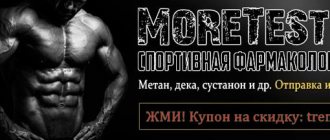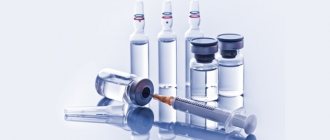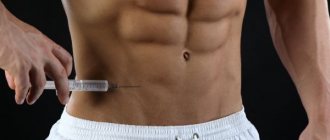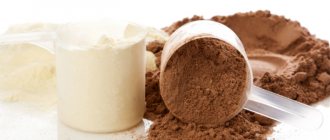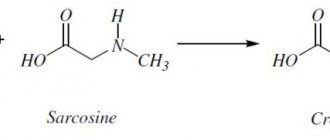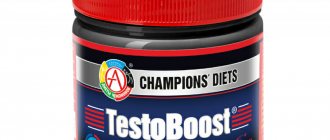Peptides in bodybuilding are becoming more and more popular every year. On the one hand, this is due to the fact that they give a truly noticeable result, on the other hand, because they are much easier to obtain than anabolic steroids. This is also explained by the fact that their turnover is practically not controlled at the legislative level. By the way, peptides have little in common with steroids, even though they are often put on the same level. But one way or another, the fact remains that they are very popular, quite effective, relatively affordable and, most importantly, legal. It is by the sum of these factors that they enjoy significant authority. Today we will understand why peptides are needed in sports and bodybuilding.
Peptides: general information
What are peptides? From a biochemical point of view, these are organic molecules consisting of several dozen amino acids linked by amide bonds. All protein molecules are formed from similar amino acid chains. The key difference from proteins is that peptides are composed of a small number of amino acids and do not have a complex three-dimensional structure.
Peptides used in sports are synthesized in laboratories using genetic engineering technologies. To date, scientists have learned to produce more than one and a half thousand types of peptides. Not all are relevant in sports, but some allow you to get amazing results while gaining weight, cutting and losing weight, as well as when working on strength indicators and during the recovery period from injuries.
The influence of peptides on the human body goes beyond the sports plane. They improve carbohydrate, protein and lipid metabolism, stimulate angiogenesis and have a rejuvenating effect, which manifests itself in improving the appearance of skin and hair. Many drugs stimulate natural testosterone production, increase bone density, protect the heart and strengthen the joint and ligament system.
Peptide set “Sports”
TD Peptide Bio proposed using a specially formed peptide set in order to improve sports performance.
The goal of the set is to support the functioning of organs that are subject to the greatest stress during training and improve the athlete’s recovery, counteracting the development of consequences from excessive physical exertion.
The peptide bioregulators included in the set have undergone the necessary clinical studies and are absolutely safe for the body. They do not cause side effects or overdoses.
Their high degree of absorption allows us to recommend them to both amateurs and professional athletes who strive to maintain a high level of vital resources for many years.
The main products of peptides in sports from the set are the peptide bioregulators bronchogen, cardiogen and testogen.
The first two drugs stimulate the functioning of the lungs, heart and blood vessels, and the third is used to form muscle mass in men and women in order to avoid overexpending their own Iranian resources.
When taking care of an athlete’s health, it is important to understand the need to use additional nutritional supplements and vitamins that will help regulate the body’s condition, prolonging its vital resources.
Peptides in sports - reviews from those who have taken TD Peptide Bio drugs are always positive. Just one course allows you to seriously increase the load, achieving improved results, as well as get rid of the problems associated with every amateur and beginner in the form of malfunctions in individual systems - respiratory, cardiovascular, nervous. For professionals, peptide therapy is necessary as an additional natural and safe doping factor.
Types of peptides. Mechanism of action:
The huge number of peptides makes it difficult to create a unified classification, but they can still be divided into groups according to their mechanism of action and duration of effect. Peptides, most popular in bodybuilding and other types of strength sports, enhance the synthesis of endogenous Growth Hormone in the pituitary gland. Depending on which pituitary cell receptors they activate, peptides are divided into:
- Ghrelin receptor agonists.
- Analogues of hypothalamic releasing hormones.
Ghrelin receptor agonists include ipamorelin, hexarelin, GHRP-2 and GHRP-6. Structurally, they are similar to the molecule of the hormone ghrelin, which activates specific receptors in the pituitary gland and enhances the synthesis of GH. Analogs of releasing hormones affect fundamentally different receptors (hormone receptors of the hypothalamus), but lead to a similar effect, that is, they enhance the production of GH.
Gonadorelin
- a peptide with a fundamentally different mechanism of action. It enhances the production of follicle-stimulating and luteinizing hormone (FSH and LH), thereby improving hormonal levels and naturally increasing testosterone synthesis. This feature allows you to use gonadorelin during PCT and steroid courses to maintain the secretion of your own hormones.
HGH-Frag 176-191
— some peptides do not affect hormonal levels, but have a powerful lipolytic effect. An example is HGH-Frag 176-191, which is considered a powerful fat burner. As a fragment of Growth Hormone, HGH-Frag accelerates lipolysis and fat oxidation, increasing the number of beta-3 adrenergic receptors in cell membranes. HGH-Frag does not affect the level of sex hormones, hormones of the sympathoadrenal system or the thyroid gland, and therefore has no side effects.
PEG-MGF
— this peptide is a modified mechanical growth factor (MGF). Mechanical growth factor is produced in muscle tissue in response to physical activity. It is MFR that triggers the process of proliferation of satellite cells, which underlies muscle hyperplasia. The problem is that the MFR is destroyed very quickly - within 30 minutes.
The PEG-MGF peptide contains an MGF molecule that is protected from rapid degradation by PEGylation. Pegylated mechanical growth factor has similar biological properties (stimulates the division of muscle tissue satellite cells), but remains in active form for several days. In addition to the anabolic effect, PEG-MGF accelerates fat burning and has a cardioprotective effect.
Long and short acting peptides:
According to the duration of the effect, peptides with long and short action are distinguished. Short peptides (GHRP-2) are eliminated from the body quickly; injections must be done several times a day. For example, the half-life of the CJC-1295 peptide without DAC is about 30 minutes. This feature cannot be considered a disadvantage. Short peptides are very effective for peaking the concentration of Growth Hormone in the blood, and “long” peptides help increase the basal level of somatotropin.
Peptides with a long elimination period (CJC-1295 DAC, PEG-MGF) circulate in the blood for a long time; It is enough to give injections once every 3-4 days or once a week. Some peptides (TB-500) require an initial loading phase, after which they are administered at a maintenance dosage.
Results and reviews
Evgeniy, 31 years old:
“I’ve heard very different reviews about peptides. I decided to accept them. I started taking peptide TV-500. The muscles have acquired elasticity. Recovery after training is easier and faster, although the load is considerable. I’m very pleased with the result.”
Igor, 25 years old:
“Took GHRP-2 and GHRP-6. This allowed me to combine training in sambo in the first half of the day and powerlifting in the afternoon. Weight decreased, energy increased, sleep and appetite improved. Highly recommend!".
Alexander, 27 years old:
“Very pleased with the peptides. Thanks to them, muscles quickly recover, even with injuries. Did injections with methane. As a result, all the sores went away. Only small pimples appeared on the body, but this “sacrifice” is insignificant.”
Effects of peptides:
What benefits does the use of peptides give to an athlete? By improving carbohydrate, protein and lipid metabolism, positive changes in body composition are achieved. The gain of lean muscle mass accelerates, while fat burning also accelerates. The percentage of skeletal muscle mass increases, and the percentage of adipose tissue steadily decreases.
Optimizing carbohydrate and fat metabolism provides muscles with additional fuel. Rapid replenishment of energy resources allows you to save muscle glycogen and protects contractile proteins from breakdown. Many peptides have a direct anti-catabolic effect. Prompt replenishment of energy reserves allows you to increase the intensity of training, reduce pauses between approaches, increase the number of working sets and repetitions, and use high-intensity training techniques.
On a course of peptides, tolerance increases not only to anaerobic, but also to aerobic exercise, which makes them effective in sports that require enormous endurance (cycling, athletics). An additional bonus will be the stimulation of angiogenesis - the formation of new arteries in the muscles, through which oxygen and nutrients will be delivered.
Peptides contribute to the rapid growth of speed and strength indicators. Benchers, powerlifters and weightlifters use peptides to increase one-time maximum, peak strength and strength endurance. Sprinters, cyclists - to develop speed data.
One of the main purposes of using peptides is injury prevention and rehabilitation after injuries. During the AAS course, muscle growth, as a rule, outstrips the rate of strengthening of ligaments and tendons; hence the predisposition to injuries and constant joint pain. Peptides strengthen the joint-ligamentous system and allow you to train without forced breaks for rehabilitation. Growth Hormone has a similar effect, but the advantage of the peptide course is that it is much cheaper.
Of course, the effect of peptides on sports performance depends on the mechanism of action and the type of drug. Some peptides are ideal for mass-gaining cycles, while others (HGH-Frag) give fantastic results during pre-competition preparation and cutting.
Harm and side effects
Using peptides in bodybuilding can harm your health.
Along with positive properties, these substances also have negative ones if used in excessively large quantities or in high concentrations.
The result of the action of peptides is clearly visible, and many bodybuilders get carried away with it, forgetting about health and reasonable measures. Taking peptides in excessive doses can lead to the following side effects:
- Protein poisoning . Often observed among beginners who strive to quickly acquire the desired relief. By taking structural peptides, the bodybuilder saturates his body with amino acids for the structure of proteins. If there are too many of these amino acids, the liver begins to suffer.
- Discrepancy between force and mass . Gaining strength and mass should occur in direct proportion. If the muscles grow faster than the ligaments strengthen, the bodybuilder may end up seriously injured and then spend a lot of time recovering.
- Individuality . Peptides are substances that stimulate the production of hormones, but each body is different. At the very beginning, it is worth observing yourself and the body’s own reaction to peptides. In one person, the level of hormones may remain almost unchanged, while in another it will skyrocket tenfold.
- External manifestations . After injections, irritation or a slight rash may appear.
- Decreased appetite . Peptides suppress appetite and give a feeling of joy, but this is deceiving and it is worth remembering. A bodybuilder who spends a lot of time in the gym must eat well, otherwise a loss of strength may occur or health problems will begin and he will have to leave the sport.
- Poor quality product . Remember that there are also fakes on the market. Some are harmless, and any damage is limited to the amount spent. And there are those that can cause serious poisoning or other troubles. Try to buy peptides in trusted places, pay attention to reviews.
- Lack of work for scientists . Today there is no active official work on the part of scientists that would confirm or refute certain properties of peptides. There are no official medical developments regarding improving the composition or action of substances.
If you follow all the rules for taking peptides that are indicated on the package, then you don’t have to worry about side effects.
The main effects of peptides in sports:
- Anabolic;
- Anti-catabolic;
- Lipolytic;
- Increased endurance;
- Increase in strength indicators;
- Prevention of injuries.
Will people who do not strive for high athletic achievement benefit from peptides? They definitely will. For those wishing to lose weight, peptides will help you quickly see results and gain additional motivation to move forward. Women should pay attention to two effects of peptides. Firstly, they increase bone mineral density, and this is of enormous importance from the point of view of preventing osteoporosis. Secondly, peptides have a rejuvenating effect!
Peptides increase the body’s adaptive capabilities, increase the strength of joints and tendons, heart muscle, and blood vessels. The positive effect on carbohydrate and fat metabolism cannot be ignored. Normalization of metabolic processes reduces the risk of obesity, atherosclerosis, diabetes mellitus, arterial hypertension, and coronary artery disease.
How to use peptides?
Peptides are available in bottles with lyophilized powder. Read the instructions carefully. Dilute the powder with water for injection or bacteriostatic water. Add water gradually so that it slowly flows down the walls. Do not shake; dissolve the powder by gently shaking the bottle. Peptides are placed subcutaneously in a fold on the abdomen or intramuscularly with an insulin syringe. The dosage and frequency of injections depend on the drug. The duration of the course is from 2 to 3 months. For maximum effect, you can combine peptides with SARMs and GH.
Go to purchase Categories
Like0
Tags: peptides
